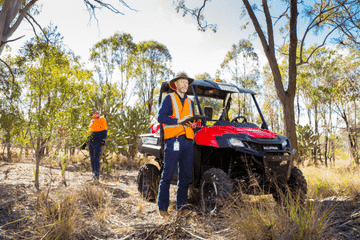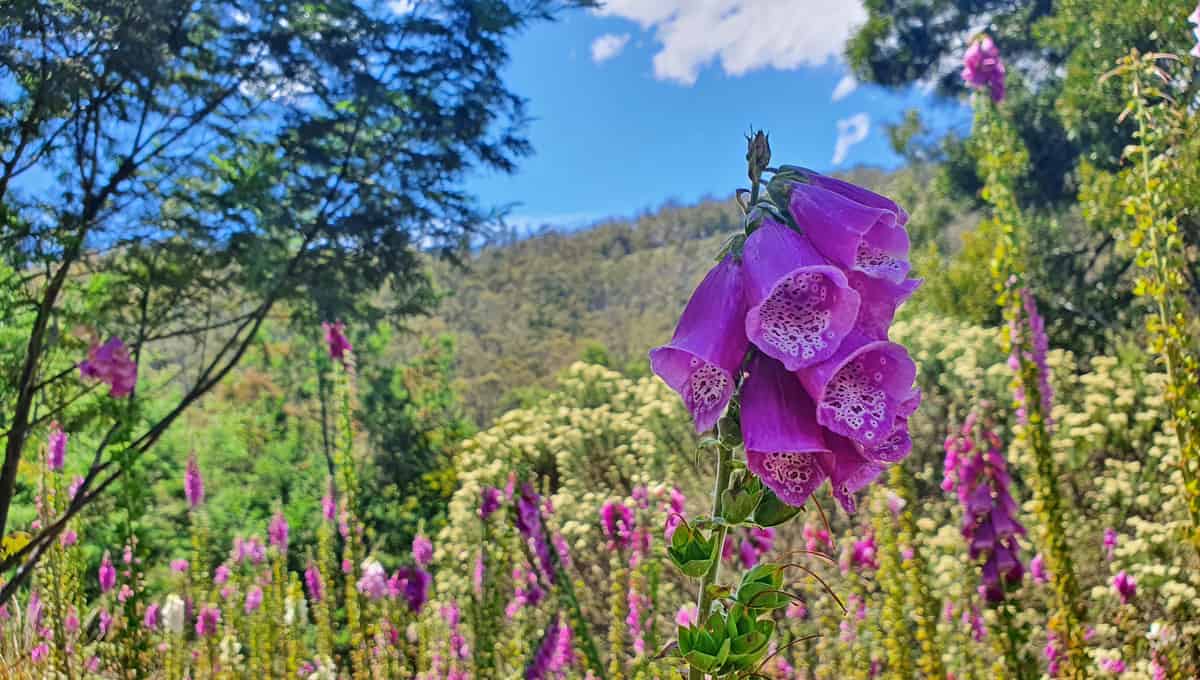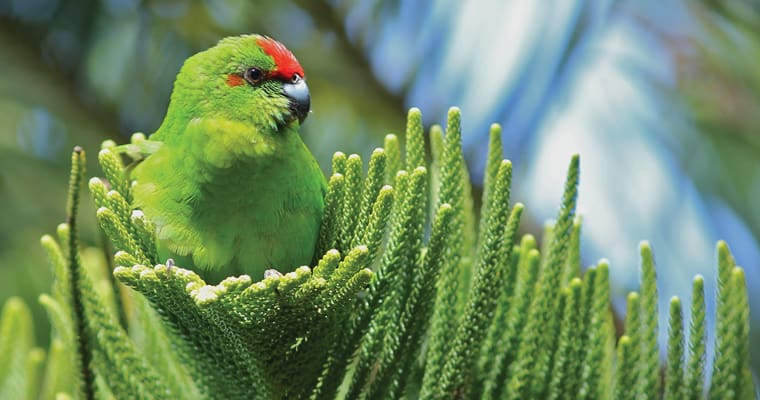
Mobile invasive plant map for the ACT wins Froggatt Award
Steve Taylor has been awarded a Froggatt Award for championing a new way of mapping invasive plants across the ACT.

Steve Taylor has been awarded a Froggatt Award for championing a new way of mapping invasive plants across the ACT.

The flowers of a rubber vine are annoyingly pretty. But its vanity is also the secret to its downfall along the Fitzroy River in Western Australia.

The Invasive Species Council welcomes today’s commitment by NSW Labor to fund 100 new National Parks field officers to tackle uncontrolled weeds and pests, maintain fire trails and support firefighting efforts.

Ahead of the NSW election, the Invasive Species Council has sounded a warning that NSW faces a pest and weed disaster due to the cumulative effect of recent natural disasters, climate change, underfunding and a lack of political will.

Some academics have claimed that Indigenous people welcome introduced species and do not want them controlled. The Indigenous chapter of the 2021 State of the Environment Report can’t be reconciled with these comments.

A commitment to tackle a major invasive ant risk in the Townsville and Cairns regions has been locked in by the Albanese Government in the federal budget.

The 2022 federal election has been labelled a “greenslide”, with Australians turning out to vote for action on climate change and the environment.

Territory residents and leading invasive species experts have described Federal Labor’s commitment today to a package of $9.8 million in funding for jobs tackling gamba

Three new national Froggatt Award winners were announced today, while a 2019 award to Southern Downs Regional Council was revoked.

The community campaign Gamba Grass Roots has been awarded a national Froggatt Award for their work tackling one of Australia’s most alarming invasive species.

The Western Riverina Pest Project has been awarded a national Froggatt Award for undertaking the largest feral pig control program in Australia.

Territory residents and leading invasive species experts are calling on all federal Australian political parties to commit to funding that will tackle Gamba grass

Jim Godfrey is on a mission to have foxglove listed a declared weed in Tasmania.

A damning report reveals Victoria’s ecosystems will head into terminal decline without clear and decisive action.

For the first time ever the native vegetation of Norfolk Island has been mapped, both as it exists now and before European arrival.

Steve Taylor has been awarded a Froggatt Award for championing a new way of mapping invasive plants across the ACT.

The flowers of a rubber vine are annoyingly pretty. But its vanity is also the secret to its downfall along the Fitzroy River in Western Australia.

The Invasive Species Council welcomes today’s commitment by NSW Labor to fund 100 new National Parks field officers to tackle uncontrolled weeds and pests, maintain fire trails and support firefighting efforts.

Ahead of the NSW election, the Invasive Species Council has sounded a warning that NSW faces a pest and weed disaster due to the cumulative effect of recent natural disasters, climate change, underfunding and a lack of political will.

Some academics have claimed that Indigenous people welcome introduced species and do not want them controlled. The Indigenous chapter of the 2021 State of the Environment Report can’t be reconciled with these comments.

A commitment to tackle a major invasive ant risk in the Townsville and Cairns regions has been locked in by the Albanese Government in the federal budget.

The 2022 federal election has been labelled a “greenslide”, with Australians turning out to vote for action on climate change and the environment.

Territory residents and leading invasive species experts have described Federal Labor’s commitment today to a package of $9.8 million in funding for jobs tackling gamba

Three new national Froggatt Award winners were announced today, while a 2019 award to Southern Downs Regional Council was revoked.

The community campaign Gamba Grass Roots has been awarded a national Froggatt Award for their work tackling one of Australia’s most alarming invasive species.

The Western Riverina Pest Project has been awarded a national Froggatt Award for undertaking the largest feral pig control program in Australia.

Territory residents and leading invasive species experts are calling on all federal Australian political parties to commit to funding that will tackle Gamba grass

Jim Godfrey is on a mission to have foxglove listed a declared weed in Tasmania.

A damning report reveals Victoria’s ecosystems will head into terminal decline without clear and decisive action.

For the first time ever the native vegetation of Norfolk Island has been mapped, both as it exists now and before European arrival.

Steve Taylor has been awarded a Froggatt Award for championing a new way of mapping invasive plants across the ACT.

The flowers of a rubber vine are annoyingly pretty. But its vanity is also the secret to its downfall along the Fitzroy River in Western Australia.

The Invasive Species Council welcomes today’s commitment by NSW Labor to fund 100 new National Parks field officers to tackle uncontrolled weeds and pests, maintain fire trails and support firefighting efforts.

Ahead of the NSW election, the Invasive Species Council has sounded a warning that NSW faces a pest and weed disaster due to the cumulative effect of recent natural disasters, climate change, underfunding and a lack of political will.

Some academics have claimed that Indigenous people welcome introduced species and do not want them controlled. The Indigenous chapter of the 2021 State of the Environment Report can’t be reconciled with these comments.

A commitment to tackle a major invasive ant risk in the Townsville and Cairns regions has been locked in by the Albanese Government in the federal budget.

The 2022 federal election has been labelled a “greenslide”, with Australians turning out to vote for action on climate change and the environment.

Territory residents and leading invasive species experts have described Federal Labor’s commitment today to a package of $9.8 million in funding for jobs tackling gamba

Three new national Froggatt Award winners were announced today, while a 2019 award to Southern Downs Regional Council was revoked.

The community campaign Gamba Grass Roots has been awarded a national Froggatt Award for their work tackling one of Australia’s most alarming invasive species.

The Western Riverina Pest Project has been awarded a national Froggatt Award for undertaking the largest feral pig control program in Australia.

Territory residents and leading invasive species experts are calling on all federal Australian political parties to commit to funding that will tackle Gamba grass

Jim Godfrey is on a mission to have foxglove listed a declared weed in Tasmania.

A damning report reveals Victoria’s ecosystems will head into terminal decline without clear and decisive action.

For the first time ever the native vegetation of Norfolk Island has been mapped, both as it exists now and before European arrival.
Get our blog the Feral Herald delivered to your inbox.
Our protected areas are being trashed, trampled, choked and polluted by an onslaught of invaders. Invasive species are already the overwhelming driver of our animal extinction rate, and are expected to cause 75 of the next 100 extinctions.
But you can help to turn this around and create a wildlife revival in Australia.
From numbats to night parrots, a tax-deductible donation today can help defend our wildlife against the threat of invasive weeds, predators, and diseases.
As the only national advocacy environment group dedicated to stopping this mega threat, your gift will make a big difference.
A silent crisis is unfolding across Australia. Every year, billions of native animals are hunted and killed by cats and foxes. Fire ants continue to spread and threaten human health. And the deadly strain of bird flu looms on the horizon. Your donation today will be used to put the invasive species threat in the media, make invasive species a government priority, ensure governments take rapid action to protect nature and our remarkable native wildlife from invasives-led extinction, death and destruction.
If you are having trouble submitting a form, please read this guide.
Please fill out the following form and one of our team will be in contact to assist as soon as possible. Please make sure to include any helpful information, such as the device you were using (computer, tablet or mobile phone) and if known, your browser (Mozilla Firefox, Chrome, Safari etc)
"*" indicates required fields
Dear Project Team,
[YOUR PERSONALISED MESSAGE WILL APPEAR HERE.]
I support the amendment to the Kosciuszko National Park Wild Horse Heritage Management Plan to allow our incredible National Parks staff to use aerial shooting as one method to rapidly reduce feral horse numbers. I want to see feral horse numbers urgently reduced in order to save the national park and our native wildlife that live there.
The current approach is not solving the problem. Feral horse numbers have rapidly increased in Kosciuszko National Park to around 18,000, a 30% jump in just the past 2 years. With the population so high, thousands of feral horses need to be removed annually to reduce numbers and stop our National Park becoming a horse paddock. Aerial shooting, undertaken humanely and safely by professionals using standard protocols, is the only way this can happen.
The government’s own management plan for feral horses states that ‘if undertaken in accordance with best practice, aerial shooting can have the lowest negative animal welfare impacts of all lethal control methods’.
This humane and effective practice is already used across Australia to manage hundreds of thousands of feral animals like horses, deer, pigs, and goats.
Trapping and rehoming of feral horses has been used in Kosciuszko National Park for well over a decade but has consistently failed to reduce the population, has delayed meaningful action and is expensive. There are too many feral horses in the Alps and not enough demand for rehoming for it to be relied upon for the reduction of the population.
Fertility control as a management tool is only effective for a small, geographically isolated, and accessible population of feral horses where the management outcome sought is to maintain the population at its current size. It is not a viable option to reduce the large and growing feral horse population in the vast and rugged terrain of Kosciuszko National Park.
Feral horses are trashing and trampling our sensitive alpine ecosystems and streams, causing the decline and extinction of native animals. The federal government’s Threatened Species Scientific Committee has stated that feral horses ‘may be the crucial factor that causes final extinction’ for 12 alpine species.
I recognise the sad reality that urgent and humane measures are necessary to urgently remove the horses or they will destroy the Snowies and the native wildlife that call the mountains home. I support a healthy national park where native species like the Corroboree Frog and Mountain Pygmy Possum can thrive.
Dear Project Team,
[YOUR PERSONALISED MESSAGE WILL APPEAR HERE.]
I support the amendment to the Kosciuszko National Park Wild Horse Heritage Management Plan to allow our incredible National Parks staff to use aerial shooting as one method to rapidly reduce feral horse numbers. I want to see feral horse numbers urgently reduced in order to save the national park and our native wildlife that live there.
The current approach is not solving the problem. Feral horse numbers have rapidly increased in Kosciuszko National Park to around 18,000, a 30% jump in just the past 2 years. With the population so high, thousands of feral horses need to be removed annually to reduce numbers and stop our National Park becoming a horse paddock. Aerial shooting, undertaken humanely and safely by professionals using standard protocols, is the only way this can happen.
The government’s own management plan for feral horses states that ‘if undertaken in accordance with best practice, aerial shooting can have the lowest negative animal welfare impacts of all lethal control methods’.
This humane and effective practice is already used across Australia to manage hundreds of thousands of feral animals like horses, deer, pigs, and goats.
Trapping and rehoming of feral horses has been used in Kosciuszko National Park for well over a decade but has consistently failed to reduce the population, has delayed meaningful action and is expensive. There are too many feral horses in the Alps and not enough demand for rehoming for it to be relied upon for the reduction of the population.
Fertility control as a management tool is only effective for a small, geographically isolated, and accessible population of feral horses where the management outcome sought is to maintain the population at its current size. It is not a viable option to reduce the large and growing feral horse population in the vast and rugged terrain of Kosciuszko National Park.
Feral horses are trashing and trampling our sensitive alpine ecosystems and streams, causing the decline and extinction of native animals. The federal government’s Threatened Species Scientific Committee has stated that feral horses ‘may be the crucial factor that causes final extinction’ for 12 alpine species.
I recognise the sad reality that urgent and humane measures are necessary to urgently remove the horses or they will destroy the Snowies and the native wildlife that call the mountains home. I support a healthy national park where native species like the Corroboree Frog and Mountain Pygmy Possum can thrive.